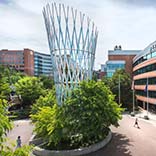Advancing Science to Address the Burden of Cancer and Related Infectious Diseases in Low-Resource Settings
Cancer is an increasingly urgent global health issue. By 2030, the global cancer burden is projected to grow by 70 percent, and more than two-thirds of cancer deaths are occurring in low- and middle-income countries. Yet only 2 percent of health funding in these countries is directed toward cancer and other noncommunicable diseases. Many of the highest-burden cancers in these regions are associated with infectious diseases, including HIV, human papillomavirus, and viral hepatitis.
Fred Hutch has a growing cross-divisional Global Oncology program that investigates globally relevant cancers and seeks to understand the varied genetics and biology of common cancers around the world. We aim to develop high-impact, low-cost diagnostic tools, and therapies that can be used in low-resource settings worldwide.
Our Priorities
Research Highlights

Cervical Cancer

Breast Cancer

Kaposi Sarcoma
Breast Cancer
In sub-Saharan Africa, fewer than half of people diagnosed with breast cancer live beyond five years, compared with almost 90 percent in the United States. We are testing a diagnostic tool that is widely available in Africa to assess its performance in determining a tumor’s hormone receptor status and other characteristics that can guide treatment. We will study the feasibility of a three-drug chemotherapy regimen that can be given orally rather than intravenously. In addition, we are using genetic sequencing to look for mutations that may explain why breast cancer in sub-Saharan Africa tends to strike younger women and be especially aggressive — characteristics also seen in breast cancer in African-American women.

“Our mission is to generate cancer and related infectious disease research with global impact and support the development of research and clinical capacity in low-resource settings."
— Dr. Edus Warren, Program Head, Global Oncology
Impact Through Collaboration
Read highlights of Global Oncology’s progress during fiscal year 2023. Learn more about our research progress and scientific achievements, training initiatives, grants and finances and lab and facility operations. The report highlights the Global Oncology and Hutchinson Centre Research Institute of Uganda teams and community.
